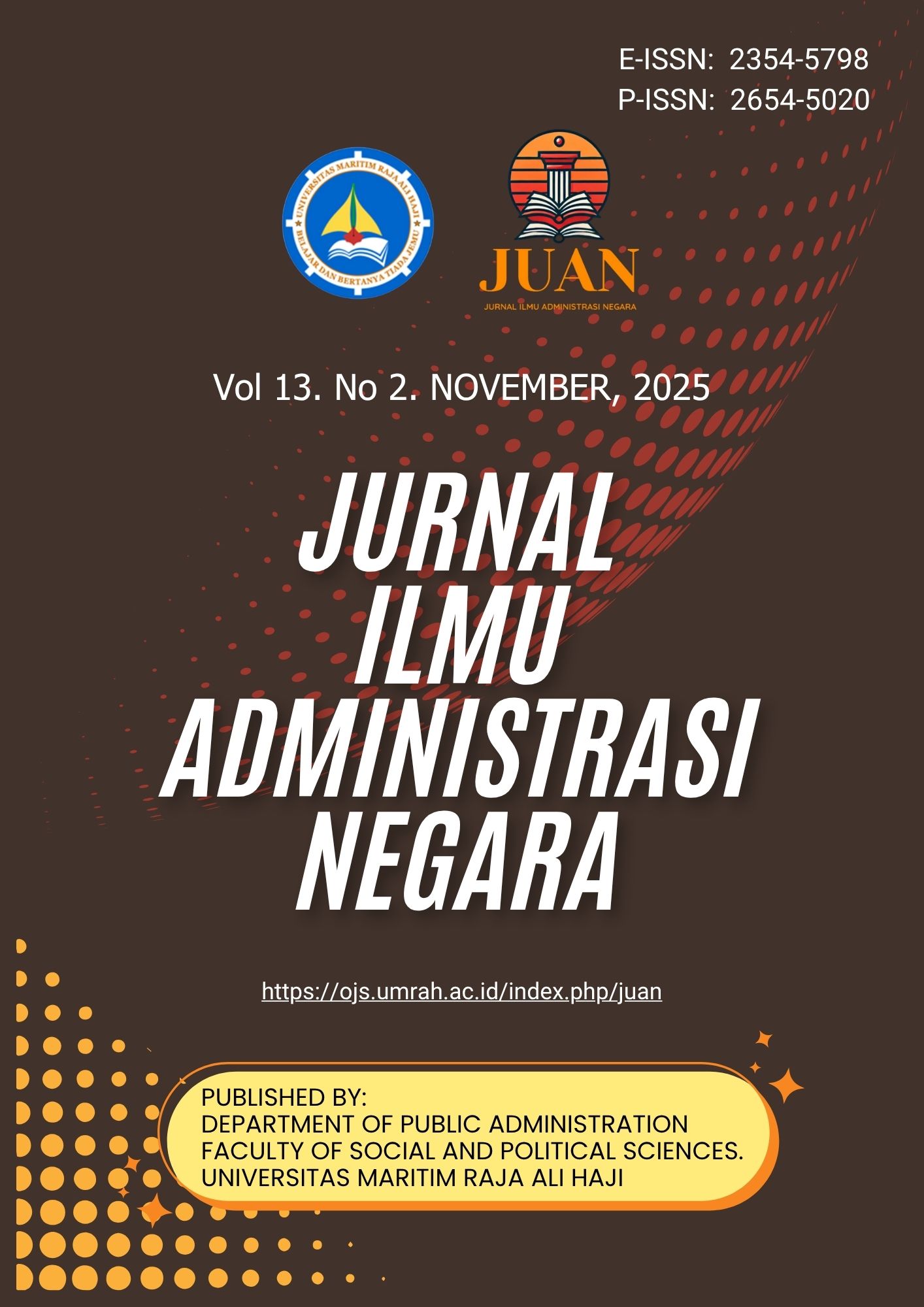Green Development through Modern Policy Redesign in the Disruptive Era within the Framework of Futuristic Transformation
DOI:
https://doi.org/10.31629/juan.v13i2.7720Keywords:
Green Development, Policy Redesign, Disruptive Era, Futuristic Transformation, Collaborative GovernanceAbstract
The rapid technological disruption and the growing urgency of environmental degradation have challenged governments to redesign their policies toward sustainability. In developing countries such as Indonesia, policy implementation for Green Development remains fragmented and often disconnected from institutional capacity and local realities. This study aims to analyze how modern policy redesign supports Green Development within the framework of futuristic transformation by integrating innovation, collaboration, and technology into local governance. Using a qualitative descriptive method, data were collected from literature reviews, policy documents, and semi-structured interviews with key stakeholders in Gorontalo Regency, including government agencies, community organizations, and environmental groups. The research adopted a thematic synthesis approach supported by triangulation and ethical validation to ensure analytical credibility. The findings indicate that the success of Green Development relies not merely on regulatory frameworks but on adaptive governance that emphasizes participatory collaboration, technological innovation, and community empowerment. The creation of Integrated Policy Task Forces (IPTF) and digital monitoring tools such as e-Monev and SP4N LAPOR has enhanced transparency, cross-sector coordination, and real-time policy evaluation. Furthermore, social adaptation through eco-literacy programs and citizen participation has strengthened the sustainability culture at the local level. This study concludes that futuristic transformation in governance requires systemic redesign, combining institutional learning, digital inclusion, and collaborative networks to achieve long-term ecological and social resilience. The Gorontalo experience demonstrates that Green Development can serve as both a strategy and a governance paradigm that redefines how the state, society, and technology co-evolve toward sustainable futures.
Downloads
References
Adiyanta, F. C. S. (2020). Urban space governance and sustainable green development in Indonesia. International Journal of Energy Economics and Policy, 10(3), 105–112. https://www.econjournals.com/index.php/ijeep/article/view/9108
Afandi, M. N., Surya, D. H., & Rofi, R. (2023). Collaborative governance in a mandated setting: A qualitative study on stunting intervention. Policy Studies, 45(1), 1–18. https://doi.org/10.1080/21665095.2023.2212868
Collaborative Governance – Can it Achieve Sustainable Development Goals (SDGs) Towards Independent Villages in Strategic Border Areas. (2023). Proceedings of the Indonesian Association for Public Administration (IAPA), 2(1), 45–56. https://journal.iapa.or.id/proceedings/article/view/882
Du, J., Liu, Y., & Chen, S. (2023). Explaining the green development behavior of local governments. Behavioral Sciences, 13(10), 813. https://doi.org/10.3390/bs13100813
Earth Innovation Institute. (2021). Profil Kabupaten Gorontalo: Integrasi Perubahan Iklim ke dalam RPJMD dan Anggaran Lokal. Earth Innovation. https://earthinnovation.org/uploads/2014/09/Profil_GORONTALO_Dunggio_2021_IND.pdf
Fan, Y., Li, X., Zhang, Z., & Wang, J. (2025). Evaluating the effects of green development policies on energy security and carbon emissions reduction. Energy Reports, 13, 1–15. https://doi.org/10.1016/j.egyr.2025.04.013
Florini, A. (2018). Collaborative governance for the Sustainable Development Goals. Asia & the Pacific Policy Studies, 5(3), 583–598. https://doi.org/10.1002/app5.252
Haris, R. A. (2024). Collaborative governance in local economic development: Studi kasus Sumenep. Journal of Local Sustainability Studies, 3(2), 77–90. https://ojs.journalsdg.org/jlss/article/view/2501
Harsanto, B. T., Puspita, R., & Wahyudi, R. (2024). Investigating the keys to the failure of inter-village collaboration. Journal of Rural Studies, 110, 123–135. https://doi.org/10.1016/j.jrurstud.2024.04.058
Hauge, J. (2025). A progressive framework for green industrial policy. Cambridge Journal of Economics, 49(2), 245–263. https://doi.org/10.1080/13563467.2025.2506655
Houssam, N., Boudarene, L., & Farrah, H. (2023). Assessing the role of green economy on sustainable development, job creation, and poverty alleviation. Heliyon, 9(8), e18642. https://doi.org/10.1016/j.heliyon.2023.e18642
Hu, X., Wang, Y., & Liu, D. (2025). Policy analysis for green development in the building industry in New South Wales, Australia. Buildings, 15(19), 3557. https://doi.org/10.3390/buildings15193557
Lassa, J. A. (2023). Exploring NGOs-government collaboration strategies in disaster risk reduction and school safety. International Journal of Disaster Risk Reduction, 98, 103445. https://doi.org/10.1016/j.ijdrr.2023.103445
Limosani, M., Romano, L., & Zazzaro, A. (2025). Do green policies enhance short-term economic growth? Economic Modelling, 132, 1–12. https://doi.org/10.1016/j.econmod.2025.106723
Putra, A. A., Hasibuan, H. S., Tambunan, R. P., & Lautetu, L. M. (2024). Integration of the Sustainable Development Goals into a Regional Development Plan in Indonesia. Sustainability, 16(23), 10235. https://doi.org/10.3390/su162310235
Rasyid, S. B. A., Misran, & Saputra, H. A. (2024). A portrait of green economy governance in sustainable development in Eastern Indonesia. Jurnal Bina Praja, 16(3), 557–572. https://doi.org/10.21787/jbp.16.2024.557-572
The Importance of Government Collaboration Strategies for Integrated Tourist Village Destinations. (2024). RGSA Open Access Journal, 6(2), 101–115. https://rgsa.openaccesspublications.org/rgsa/article/view/5386
Tödtling, F., Trippl, M., & Huber, D. (2020). Policy options for green regional development: Adopting a subnational perspective. Science and Public Policy, 47(6), 865–877. https://doi.org/10.1093/scipol/scaa047
Universitas Gorontalo. (2024). Gorontalo Development Review (GOLDER): Kajian Pembangunan Ekonomi dan Lingkungan di Gorontalo. Universitas Gorontalo Press. https://jurnal.unigo.ac.id/index.php/gdrev
Wu, J., Guo, S., Huang, H., Liu, W., & Xiang, Y. (2018). Information and communications technologies for sustainable development goals: State-of-the-art, needs and perspectives. arXiv preprint arXiv:1802.09345. https://arxiv.org/abs/1802.09345
Zou, X., Chen, H., & Zhang, J. (2024). The green development effect of science and technology finance policy reform. Frontiers in Environmental Science, 12, 1463679. https://doi.org/10.3389/fenvs.2024.1463679
Downloads
Published
Issue
Section
License
Copyright (c) 2025 Franky Djafar

This work is licensed under a Creative Commons Attribution-ShareAlike 4.0 International License.
You are free to:
- Share — copy and redistribute the material in any medium or format for any purpose, even commercially.
- Adapt — remix, transform, and build upon the material for any purpose, even commercially.
- The licensor cannot revoke these freedoms as long as you follow the license terms.
Under the following terms:
- Attribution — You must give appropriate credit, provide a link to the license, and indicate if changes were made . You may do so in any reasonable manner, but not in any way that suggests the licensor endorses you or your use.
- ShareAlike — If you remix, transform, or build upon the material, you must distribute your contributions under the same license as the original.
- No additional restrictions — You may not apply legal terms or technological measures that legally restrict others from doing anything the license permits.














